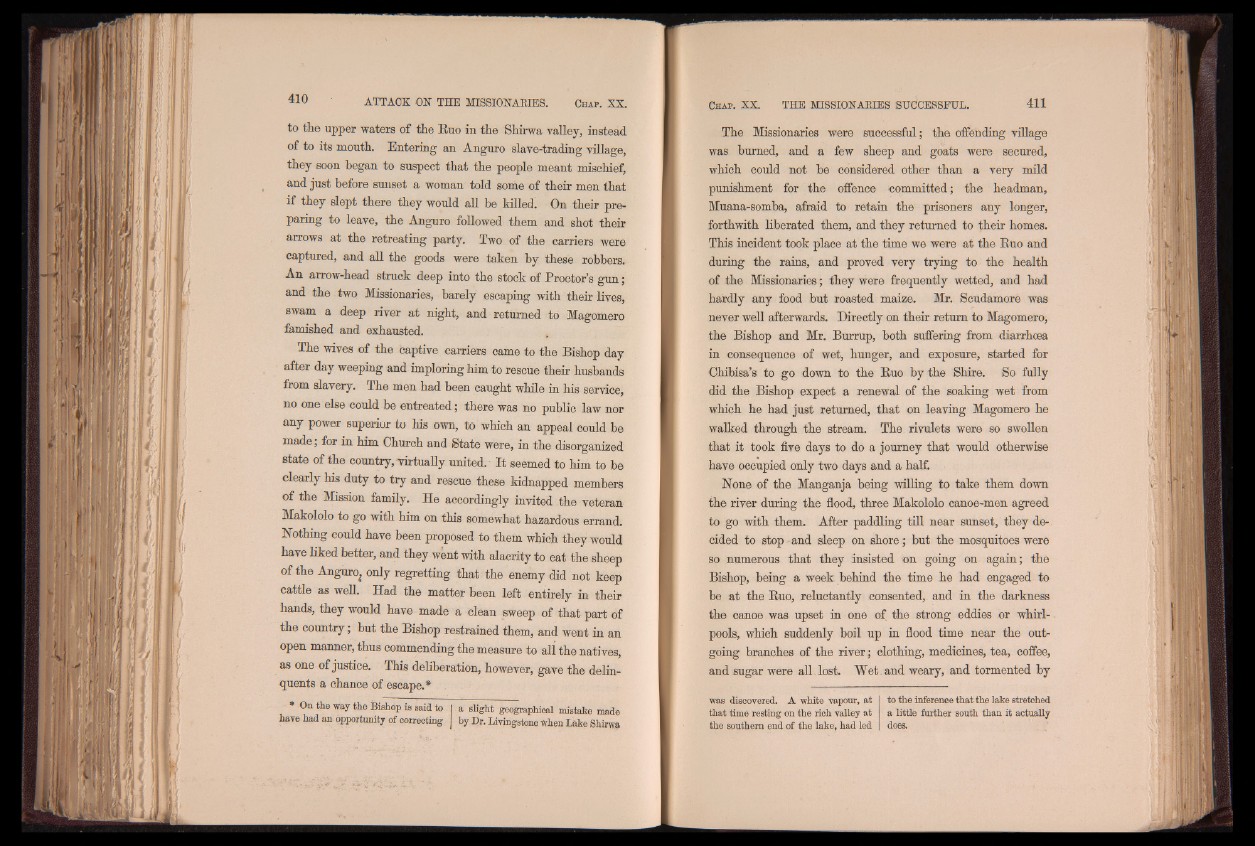
to the upper waters of the Euo in the Shirwa valley, instead
of to its mouth. Entering an Anguro slave-trading village,
they soon began to suspect that the people meant mischief,
and just before sunset a woman told some of their men that
if they slept there they would all be killed. On their preparing
to leave, the Anguro followed them and shot their
arrows at the retreating party. Two of the carriers were
captured, and all the goods were taken by these robbers.
An arrow-head struck deep into the stock of Proctor’s gun;
and the two Missionaries, barely escaping with their lives,
swam a deep river at night, and returned to Magomero
famished and exhausted.
The wives of the captive carriers came to the Bishop day
after day weeping and imploring him to rescue their husbands
from slavery. The men had been caught while in his service,
no one else could be entreated; there was no public law nor
any power superior to his own, to which an appeal could be
made; for in him Church and State were, in the disorganized
state of the country,-virtually united. I t seemed to him to be
clearly his duty to try and rescue these kidnapped members
of the Mission family. He accordingly invited the veteran
Makololo to go with him on this somewhat hazardous errand.
Nothing could have been proposed to them which they would
have liked better, and they went with alacrity to eat the sheep
of the Anguro^ only regretting that the enemy did not keep
cattle as well. Had the matter been left entirely in their
hands, they would have made a clean sweep of that part of
the country; but the Bishop restrained them, and went in an
open manner, thus commending the measure to all the natives,
as one of justice. This deliberation, however, gave the delinquents
a chance of escape.*
On the way the Bishop is said to a slight geographical mistake made
have had an opportunity of correcting by Dr. Livingstone When TAlra Shirwa
The Missionaries were successful; the offending village
was burned, and a few sheep and goats were secured,
which could not be considered other than a very mild
punishment for the offence committed; the headman,
Muana-somba, afraid to retain the prisoners any longer,
forthwith liberated them, and they returned to their homes.
This incident took place at the time we were at the Buo and
during the rains, and proved very trying to the health
of the Missionaries; they were frequently wetted, and had
hardly any food but roasted maize. Mr. Scudamore was
never well afterwards. Directly on their return to Magomero,
the Bishop and Mr. Burrup, both suffering from diarrhoea
in consequence of wet, hunger, and exposure, started for
Chibisa’s to go down to the Buo by the Shire. So fully
did the Bishop expect a renewal of the soaking wet from
which he had just returned, that on leaving Magomero he
walked through the stream. The rivulets were so swollen
that it took five days to do a journey that would otherwise
have occupied only two days and a half.
None of the Manganja being willing to take them down
the river during the flood, three Makololo canoe-men agreed
to go with them. After paddling till near sunset, they decided
to stop and sleep on shore; but the mosquitoes were
so numerous that they insisted on going on again; the
Bishop, being a week behind the time he had engaged to
be at the Buo, reluctantly consented, and in the darkness
the canoe was upset in one of the strong eddies or whirlpools,
which suddenly boil up in flood time near the outgoing
branches of the river; clothing, medicines, tea, coffee,
and sugar were all lost. Wet and weary, and tormented by
was discovered. A white vapour, at to the inference that the lake stretched
that time resting on the rich valley at a little further south than it actually
the southern end of the lake, had led does.